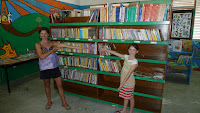The down side of hunting for beach treasures is your eyes cannot simultaneously scan the horizon. In Dominica, however, the horizon sometimes finds you. “What are you looking for?” The guy making charcoal looks up from his work as I walk by him the other morning. I explain and he leaves his shovel and tells me he is going to help. “You need to return to Boston with a full plastic, man!” The horizon twists, and I have a partner in my quest. In the seven years I’ve been filling up baggies with beach finds, locals have observed my strange white person behaviors, smiled and waved as they see me in the mornings, and sometimes even offered marriage proposals. Never have I had any local offer to help.
Julian answers my questions about making charcoal, but we mostly walk in silence. He shows me how to look for the smoothest glass under the rocks at the end of the beach. Once we reach the far side, there is a woman I see some days who calls out to me. “I collect shells, too, and I want to give you these,” she empties the treasures into my bag. She smiles and contributes without asking. I return the smile and thank her.

Two years ago when we left St. Joseph Primary School, our book donations were up to a thousand for the assortment of books that made up a library that migrated in bins, depending on where there was space and time to use it. Last year, we built a shelf to hold over a thousand books. This month, we walked into the former classroom that when we last saw it, had books scattered in piles on the floor and a new, large, unpainted bookshelf. We could not believe what we saw. More shelving had been built, hundreds more books were neatly arranged on tables, the students had painted nearly every inch of the space in vibrant murals. We did not ask for help. It was given and the results overwhelmed us.

I never thought we’d get to a point in our work at the school where we could walk out of that library and pronounce our work “done.” Yet last week after organizing shelves and categorizing the books, we looked at each other and said just that. When multiple people contribute, the plastic baggie fills with treasure quickly.
Before arriving this year, we got word of another library project started by a local transplant to Mero. We donated three of our six barrels of books to her before realizing there wasn’t yet a physical structure to house them. “This is amazing,” Maureen says, “you’ve just tripled our inventory!” She tells us that she’s been building a house and has been too busy to open the library the last couple weeks, and we tell her we can do it for her. With a surprised smile, she accepts our help.
Twice a week we have helped catalog the new books and set out the bins for locals to browse. The magazines are popular with the older ladies who cannot read. The piles of picture books draw the younger kids. The girls’ local friends help us label the new books and we create a production line at the picnic table. Many hands help the baggie fill quickly.
Now, in our last week, we start to step back and watch as others take over what is needed. St. Joseph Primary will raise funds to build additional shelving and add carpeting. We find another friend in the village to open the Mero library on Thursdays and another to continue cataloguing the new books. As I walk the beach, I think about my tendency to look down while I am working. How many opportunities have I missed by not receiving help? I head out this morning and remind myself of the treasures on the horizon as well as in the sand, and I am grateful to so many for helping us fill the “plastic”.





















